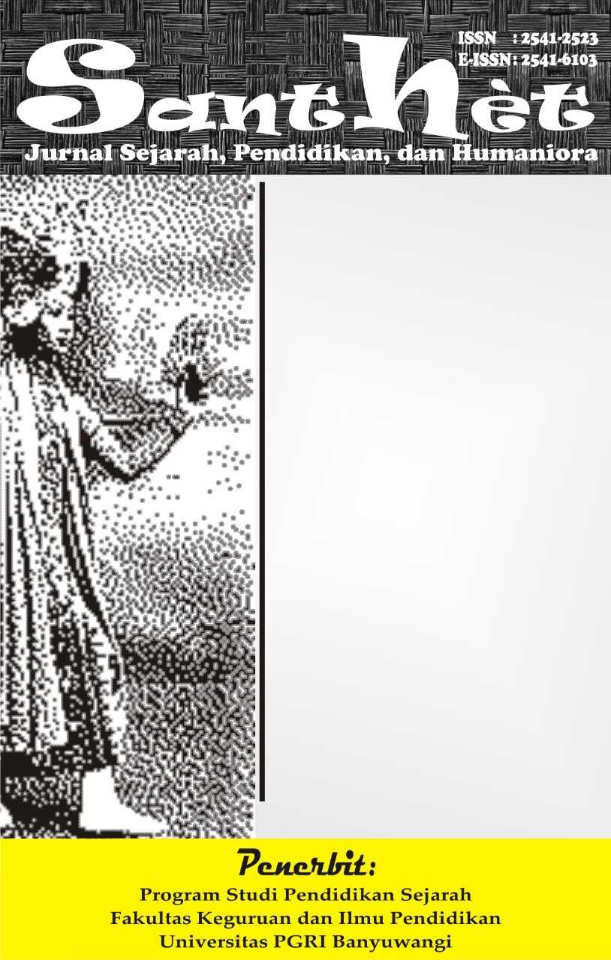Salatiga as Vacantie Oord: Representations of Colonial Rest Towns in Central Java, Late 19th to Early 20th Century
Salatiga Sebagai Vacantie Oord: Representasi Kota Peristirahatan Kolonial di Jawa Tengah Akhir Abad ke-19 sampai Awal Abad ke-20
DOI:
https://doi.org/10.36526/santhet.v9i5.6222Keywords:
Salatiga, vacation resort, colonial town, Dutch East Indies, spatial planningAbstract
This study examines how the city of Salatiga was constructed and represented as a vacantie oord or colonial resort town by the Dutch East Indies government in the late 19th to early 20th centuries. Using a historical qualitative approach, this paper seeks to reconstruct Salatiga's strategic role within the network of colonial cities in Central Java by examining aspects of urban planning, administrative regulations, and the colonial narratives that emerged during that period. Primary sources used include official colonial documents such as Staatsblad van Nederlandsch-Indië No. 266 of 1917, city map archives, colonial photographs, and tourist brochures published by the Toeristenverkeer institution. This research also utilizes secondary literature on colonial urban history and tropical spatial studies.
The results of the study show that Salatiga was chosen as a resort town because of its strategic location on the slopes of Mount Merbabu, its cool climate, clean air, and the presence of natural water sources. The colonial government actively developed the urban layout of Salatiga through the construction of villas, hotels, parks, and recreational facilities that supported the city's image as a place of recovery and relaxation for the European elite. This study demonstrates that the image of a vacantie oord not only reflected colonial recreational needs but also served as an instrument of power manifested through the physical forms of the city.
References
Algemeen handelsblad voor Nederlandsch-Indië 17 Februari 1932
ANRI, Staatsblad No. 266 tanggal 25 Juni 1917.
Anwar, M. K. (2019). Rekonstruksi Kota Kolonial Salatiga Dan Kontribusi Teknologi Geographical Information System. Gadjah Mada Journal of Humanities, 3(2).
Colombijn, F., & Coté, J. (2014). Modernization of the Indonesian city, 1920-1960. Dalam Cars, Conduits, and Kampongs: The Modernization of the Indonesian City, 1920-1960 (hlm. 1–26). Brill. doi.org/10.1163/9789004280724_002
De Indische courant 06 April 1938
De locomotif 15 Oktober 1887
De locomotief 08 September 1933
De locomotief 25 Agustus 1934
De locomotief 27 Maret 1936
Harnoko, Darto. 2013. Pembangunan Infrastruktur Salatiga Pada Masa Gemeente Awal Abad XX. Patra Widya
Harnoko, Darto., Fibiona, Indra., Lestari, S. Nurazizah., & Muhajir, Ahmad. (2023). Salatiga : harmoni, kontinuitas, dan perubahan kultural : dalam pembangunan berkelanjutan kota, era kolonial (1800 an) hingga saat ini. Kepel Press.
Makkelo, I. D. (2017). Sejarah Perkotaan: Sebuah Tinjauan Historiografis Dan Tematis. Dalam Journal of Cultural Sciences (Vol. 12, Nomor 2). http://journal.unhas.ac.id/index.php/jlb
Kuntowidjojo. 1994. Metodologi Sejarah. Yogyakarta: Tiara Wacana.
________. 2013. Pengantar Ilmu Sejarah. Yogyakarta: Tiara Wacana
________. 2008. Penjelasan Sejarah. Yogyakarta: Tiara Wacana.
Rafsanjani, A. H. (2024). HISTORIA PEDAGOGIA Salatiga Tempo Dulu: Membongkar Lapisan Sejarah Kota Tertua di Jawa Tengah. https://journal.unnes.ac.id/journals/hp
Ramadhan, I. R. (2019). Gaya Hidup Masyarkat Perkotaan Jawa Dalam Iklan Media Cetak (1930-1942). Jurnal Pendidikan Sejarah dan Ilmu Sejarah, 2(2).
Rohman, F. A. (2020). Administrasi Pemerintahan Gemeente Di Salatiga 1917-1942.
Sidik, F. F. (2019). Mengkaji Ulang Salatiga Sebagai Kota Toleransi: Masa Kolonial Hingga Pasca-Kemerdekaan.
Widayanti, I. R., & Witasari, N. (2024). Permukiman Eropa Sekitar Toentangscheweg Kota Salatiga 1917-1942. Siginjai: Jurnal Sejarah, 4(2). https://doi.org/10.22437/js.v4i2.36224
Yuliyanto, & Tumimomor, A. (2022). Menelusuri Jejak Sejarah Gedung Pemerintahan Salatiga.





























